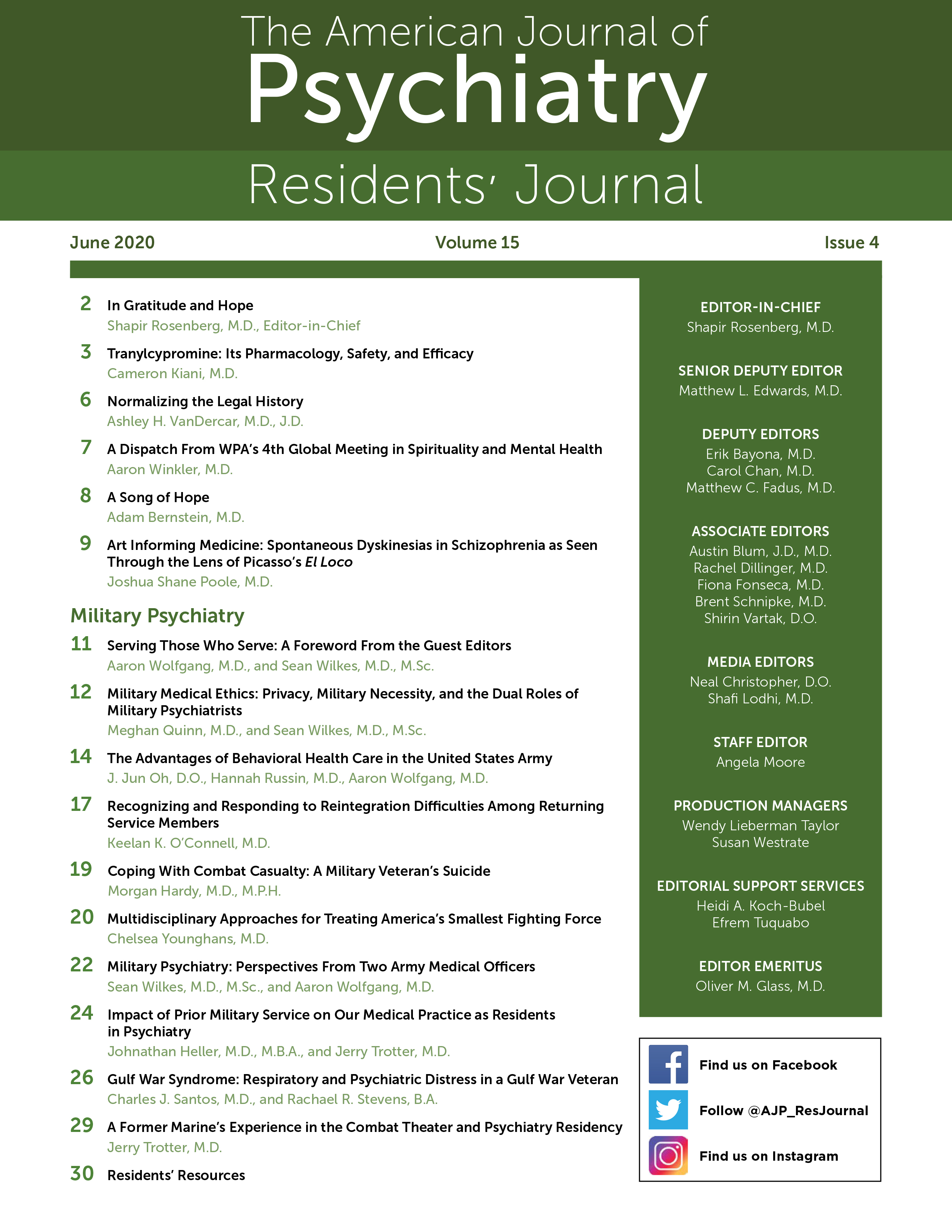Behind the ranks of the United States military, a "smaller" force, 1.7 million strong (
1), sits in classrooms, plays on sports teams, and enjoys summer days at the pool. Since 9/11, two million children have had a parent deploy (
1). Moving three times more often than their civilian classmates can lead to disrupted social environments and disorganized education (
1). One study in 2011 found that suicidal ideation was increased in teenagers with military parents, and the rate of maltreatment or abuse was up to 42% higher in a family with a parent deployed (
2).
To address the needs of military families, the Military Health System supports a multitude of Child and Adolescent Psychiatry Clinics worldwide. Two such programs that highlight unique care models are Operation BRAVE Families at Walter Reed National Military Medical Center (WRNMMC) and the School Behavioral Health Team at Tripler Army Medical Center (TAMC). Both programs use a preventive model to address behavioral health concerns for children and families while intervening with multidisciplinary teams. These programs are components of large military teaching hospitals and employ resources and personnel in contrasting environments—within a care facility and within the community.
As a result of several years of working with wounded service members and families, the Child and Adolescent Psychiatry Clinic at WRNMMC addressed the needs of this population by establishing Operation Building Resilience and Valuing Empowered Families (OBF). Two main entry points to identify families in need of OBF are through the psychiatry consult liaison service within the hospital and through family services. By automatically enrolling injured service members and their families in behavioral health programs and therapy, OBF attempts to reduce the stigma and take a preventive stance regarding mental health care. After families are identified, behavioral health support and treatment are provided through family, individual, therapeutic art, and therapeutic play sessions. OBF also provides support and training to professionals who serve military families, conducts research about the impact of war on families and professionals, and assesses its service effectiveness through assessments completed by families (
3).
Another innovative avenue that military child psychiatry has employed to provide multidisciplinary care outside the clinic is the School Behavioral Health Team (SBHT) at TAMC. This team is part of an outreach program implemented in schools where military children are enrolled. Three interrelated components of SBHT play a critical role in its effectiveness: the use of a community of practice (CoP) approach, the "embedding" of behavioral health specialists, and the application of evidence-based therapies and continuous quality improvement (CQI). The CoP approach brings together stakeholders in both the individual student's behavior as well as the school. Behavioral reports (reports to school administration about incidents of disruptive or inappropriate behavior) decreased by 50% over the course of 2 years in two separate schools in which a SBHT CoP was started (
4). Integration of SBHT with school and community mental health personnel through CoP effectively embeds SBHT providers in the school. Embedding providers may reduce the stigma often associated with seeking behavioral health care, dramatically improves access to care, and enables point-of-performance delivery of behavioral health interventions. Finally, CQI ensures continuing education and improvement at both an individual and a systems level by engaging subject matter experts when needs are identified (
4).
In and out of the clinic, the military is continuing to develop and utilize programs to address the changing needs of children. Both SBHT and OBF highlight the usefulness of preventive care in reducing stigma, providing more flexible access to behavioral health services, ensuring quality of care, and educating future psychiatrists. Moving forward, the psychiatric community can use these programs as potential models for creating comprehensive care, especially as military medicine changes and the potential for direct access to active duty military child psychiatrists may be limited. Just as warfare has changed to encompass a 360-degree battlefield, military children must be supported in a multifaceted and comprehensive approach in the fight for mental wellness.
Acknowledgments
The author thanks Dr. Alvi Azad for his mentorship and assistance with this commentary.
